延续性动词和终止性动词区别与用法
延续性动词和非延续性动词

一.延续性动词和非延续性动词:㈠延续性动词:表示一种可以持续的行为过程或状态。
drink喝have有talk说know 知道stand站立sleep睡觉sing唱歌wait等wear穿walk走work工作rain下雨keep保持snow 下雪eat 吃read读play玩live 居住smoke 抽烟lie躺着stay保持㈡终止性动词:(非延续性动词),表示行为或者动作是短暂瞬间完成的。
come来fall倒borrow借admit承认break打破start开始join加入buy买jump跳lose丢open打开close关stop结束begin开始go走put放die死hit击中leave离开arrive到达marry结婚㈢两者的用法和区别:1.延续性动词可以用表示一段时间的状语修饰,非延续动词不可用。
How long can I keep the book.这本书我可以借多久?They will work here till next Friday.她们要在这里工作到下周五。
2.有时,非延续性动词也可以与表示一段时间的时间状语搭配,但这种表示一段时间的状语,实质上是表示一段时间内的某个时间“点”。
The play will start in half an hour.这出戏半个小时后开始。
The fire broke out during the night.火是夜间发生的。
3.非延续性动词一般不用于while引导的时间状语从句中。
While I came home, he was cooking dinner. (错)When I came home, he was cooking dinner. (对)4.用延续性动词表示一时的动作,可以在该动词前加get/begin/come.When did you get to know him?你什么时候认识他的?They begin to see that they had made a serious mistake.她们开始认识到自己犯了一个大错。
延续性动词和终止性动词

★延续性动词和终止性动词。
动词可分为:延续性动词和终止性动词。
延续性动词表示能够延续的动作,这种动作可以延续下去或产生持久影响。
如:learn, work, stand, walk, wait, watch, sing, read, sleep, live, stay等。
延续性动词可以与表示时间段的状语连用。
非延续性动词也称终止性动词、瞬间动词,表示不能延续的动作,这种动作发生后立即结束。
如:open, die, begin, come, go, move, borrow, lend, buy, arrive等。
★when, while,用法一、when1、I was just reading a book when she came into my room.她走进我房间时,我正在看书。
主句when 引导的时间状语从句2、Were you writing when the teacher came in? 老师进来的时候,你在写信吗?主句when 引导的时间状语从句3、When he was a child, he was always trying out new ideas. 他小时候就常常试验一些新的设想。
when 引导的时间状语从句主句在when引导的时间状语从句中,其谓语动词可以是延续性的,也可以是非延续性的,通常主句用过去进行时,从句用一般过去时。
二、while1、While Jim was mending his bike, Lin Tao came to see him. 正当吉姆修自行车时,林涛来看他。
while 引导的时间状语从句主句2、You can’t do your homework while you’re watching TV. 你不能一边看电视一边做家庭作业。
主句while 引导的时间状语从句在while引导的时间状语从句中,其谓语动词只能是延续性的,其引导的从句多用进行时态。
延续性动词和非延续性动词以及when-while的用法和区别

when和while引导的时间状语从句与这一时态连用。
所以区别when和while的用法成了这一单元的难点。
(一)、when,while都有“当……时候”的意思。
when既可表示某一点时间,也可以表示某一段时间。
在when引导的时间状语从句中,其谓语动词可以是延续性的,也可以是非延续性的,可与主句中的谓语动词同时发生,也可在其后发生。
例如:1、I was just reading a book when she came into my room. 她走进我房间时,我正在看书。
2、Were you writing when the teacher came in? 老师进来的时候,你在写信吗?3、When he was a child he was always trying out new ideas. 他小时候就常常试验一些新的设想。
(二)、while 只能表示某一段时间,不能表示某一点时间。
在while引导的时间状语从句中,其谓语动词只能是延续性的,而且也只能与主句中的谓语动词同时发生或存在。
例如:1、While Jim was mending his bike, Lin Tao came to see him. 正当吉姆修自行车时,林涛来看他。
2、You can’t do your homework while you’re watching TV. 你不能一边看电视一边做家庭作业。
(三)、另外,when和while的区别还在于:while引导的时间状语从句多用进行时态,而when引导的时间状语从句多用一般时态。
例如:1、While they were talking , the bell rang. 正在他们谈话的时候,上课铃响了。
2、I was doing my homework when my mother came back home yesterday evening. 昨天晚上妈妈回家的时候一、延续性动词和终止性动词的概念英语中,动词按其动作发生的方式、动作发生过程的长短,可分为延续性动词和终止性动词。
延续性动词和非延续性动词以及when_while的用法和区别

when和while引导的时间状语从句(一)、when,while都有“当……时候”的意思。
when既可表示某一点时间,也可以表示某一段时间。
在when 引导的时间状语从句中,其谓语动词可以是延续性的,也可以是非延续性的,可与主句中的谓语动词同时发生,也可在其后发生。
例如: 1、I was just reading a book when she came into my room. 她走进我房间时,我正在看书。
2、Were you writing when the teacher came in 老师进来的时候,你在写信吗3、When he was a child he was always trying out new ideas. 他小时候就常常试验一些新的设想。
(二)、while只能表示某一段时间,不能表示某一点时间。
在while引导的时间状语从句中,其谓语动词只能是延续性的,而且也只能与主句中的谓语动词同时发生或存在。
例如: 1、While Jim was mending his bike, Lin Tao came to see him. 正当吉姆修自行车时,林涛来看他。
2、You can’t do your homework while you’re watching TV. 你不能一边看电视一边做家庭作业。
(三)、另外,when和while的区别还在于:while引导的时间状语从句多用进行时态,而when引导的时间状语从句多用一般时态。
例如: 1、While they were talking , the bell rang. 正在他们谈话的时候,上课铃响了。
2、I was doing my homework when my mother came back home yesterday evening.昨天晚上妈妈回家的时候一、延续性动词和终止性动词的概念英语中,动词按其动作发生的方式、动作发生过程的长短,可分为延续性动词和终止性动词。
延续性动词和非延续性动词以及when_while的用法和区别

(一)、when,while都有“当……时候”的意思。
when既可表示某一点时间,也可以表示某一段时间。
在when 引导的时间状语从句中,其谓语动词可以是延续性的,也可以是非延续性的,可与主句中的谓语动词同时发生,也可在其后发生。
例如: 1、I was just reading a book when she came into my room. 她走进我房间时,我正在看书。
2、Were you writing when the teacher came in? 老师进来的时候,你在写信吗?3、When he was a child he was always trying out new ideas. 他小时候就常常试验一些新的设想。
(二)、while只能表示某一段时间,不能表示某一点时间。
在while引导的时间状语从句中,其谓语动词只能是延续性的,而且也只能与主句中的谓语动词同时发生或存在。
例如: 1、While Jim was mending his bike, Lin Tao came to see him. 正当吉姆修自行车时,林涛来看他。
2、You can’t do your homework while you’re watching TV. 你不能一边看电视一边做家庭作业。
(三)、另外,when和while的区别还在于:while引导的时间状语从句多用进行时态,而when引导的时间状语从句多用一般时态。
例如: 1、While they were talking , the bell rang. 正在他们谈话的时候,上课铃响了。
2、I was doing my homework when my mother came back home yesterday evening.昨天晚上妈妈回家的时候一、延续性动词和终止性动词的概念英语中,动词按其动作发生的方式、动作发生过程的长短,可分为延续性动词和终止性动词。
现在完成时之延续性动词与终止性动词延续性动词

现在完成时之现在完成时之现在完成时之现在完成时之延续性动词与终止性动词延续性动词与终止性动词延续性动词与终止性动词延续性动词与终止性动词动词按其动作发生的方式,动作发生过程的长短,分为延续性动词和终止性动词。
延续性动词表示的动词是一种延续的动作,这种动词可以延续下去或产生持久的影响。
如:learn,work,stand,lie,know,walk,keep, have,wait,watch,sing,read,sleep,live终止性动词也称非延续性动词、瞬间动词,表示的动作不能延续,即动作发生立即结束,产生某种结果。
在有了某种结果之后,就不能再继续下去。
如:leave,start,set out,arrive,reach,get to,begin, stop,shut,turn off,marry,put,put on,get up,wake,fall,join,receive, finish,end,complete,become,come,go,die,close,open,break,give, jump,buy,borrow等。
1.终止性动词的用法1)终止性动词可用来表示某一动作的完成,因此可用于现在完成时。
如: The plane has arrived飞机到了。
I have finished my homework.我已完成了作业。
2)终止性动词表示的动作极其短暂,不能持续,所以其现在完成时(只限于肯定式)不能和表示一段时间的状语连用。
如:①他死了三年了。
误:He has died for three years.②他来这儿三个月了。
误:he has come here for three months.①②两句中的动词die和come都为终止性动词,它们可用于完成时,但不能同表示一段时间的状语for three years /months连用。
那这两句如何译成英语呢?我们可采用下列方法:A.用能够表示持续状态的相应的延续性动词替换句中的终止性动词。
终止性动词与延续性动词用法
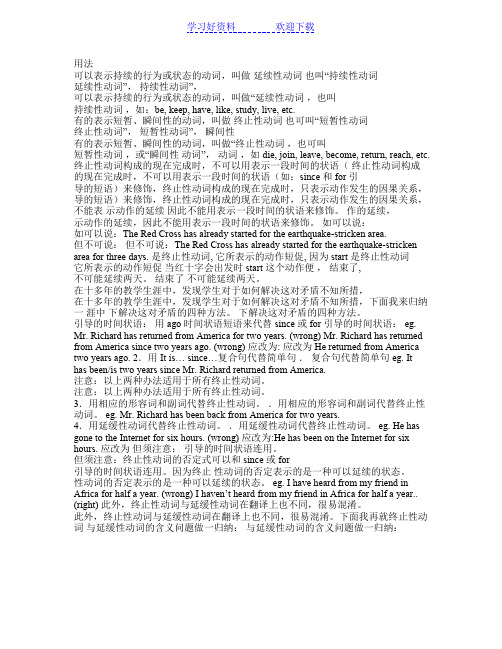
用法可以表示持续的行为或状态的动词,叫做延续性动词也叫“持续性动词延续性动词”,持续性动词”,可以表示持续的行为或状态的动词,叫做“延续性动词,也叫持续性动词,如:be, keep, have, like, study, live, etc.有的表示短暂、瞬间性的动词,叫做终止性动词也可叫“短暂性动词终止性动词”,短暂性动词”,瞬间性有的表示短暂、瞬间性的动词,叫做“终止性动词,也可叫短暂性动词,或“瞬间性动词”,动词,如 die, join, leave, become, return, reach, etc. 终止性动词构成的现在完成时,不可以用表示一段时间的状语(终止性动词构成的现在完成时,不可以用表示一段时间的状语(如:since 和 for 引导的短语)来修饰,终止性动词构成的现在完成时,只表示动作发生的因果关系,导的短语)来修饰,终止性动词构成的现在完成时,只表示动作发生的因果关系,不能表示动作的延续因此不能用表示一段时间的状语来修饰。
作的延续,示动作的延续,因此不能用表示一段时间的状语来修饰。
如可以说:如可以说:The Red Cross has already started for the earthquake-stricken area.但不可说:但不可说:The Red Cross has already started for the earthquake-stricken area for three days. 是终止性动词, 它所表示的动作短促, 因为 start 是终止性动词它所表示的动作短促当红十字会出发时 start 这个动作便,结束了,不可能延续两天。
结束了不可能延续两天。
在十多年的教学生涯中,发现学生对于如何解决这对矛盾不知所措,在十多年的教学生涯中,发现学生对于如何解决这对矛盾不知所措,下面我来归纳一涯中下解决这对矛盾的四种方法。
下解决这对矛盾的四种方法。
延续性动词和非延续性动词考点分析
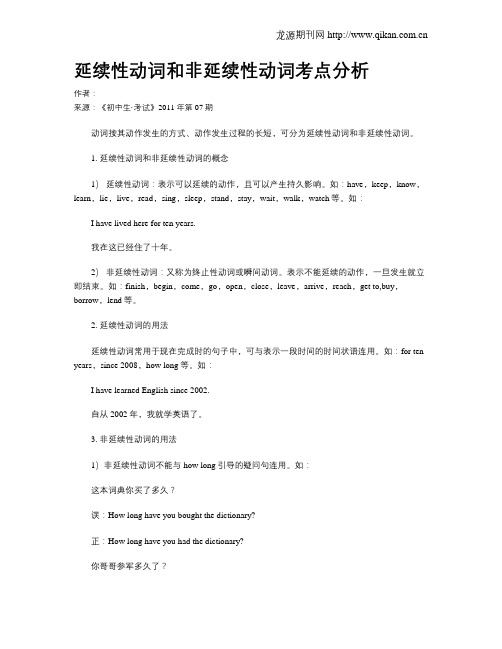
延续性动词和非延续性动词考点分析作者:来源:《初中生·考试》2011年第07期动词按其动作发生的方式、动作发生过程的长短,可分为延续性动词和非延续性动词。
1. 延续性动词和非延续性动词的概念1)延续性动词:表示可以延续的动作,且可以产生持久影响。
如:have,keep,know,learn,lie,live,read,sing,sleep,stand,stay,wait,walk,watch等。
如:I have lived here for ten years.我在这已经住了十年。
2)非延续性动词:又称为终止性动词或瞬间动词。
表示不能延续的动作,一旦发生就立即结束。
如:finish,begin,come,go,open,close,leave,arrive,reach,get to,buy,borrow,lend等。
2. 延续性动词的用法延续性动词常用于现在完成时的句子中,可与表示一段时间的时间状语连用。
如:for ten years,since 2008,how long等。
如:I have learned English since 2002.自从2002年,我就学英语了。
3. 非延续性动词的用法1)非延续性动词不能与how long引导的疑问句连用。
如:这本词典你买了多久?误:How long have you bought the dictionary?正:How long have you had the dictionary?你哥哥参军多久了?误:How long has your brother joined the army?正:How long has your brother been in the army?【体验中考】How long have you ______?For three days. (2010年滨州卷)A. got a headacheB. fallen illC. caught a coldD. had a cough[解析]get a headache(头疼),catch a cold(感冒),fall ill(生病)都是表示暂时性的动作,不能与表示一段时间的how long连用,答案为D。
延续性动词与非延续性动词用法攻略
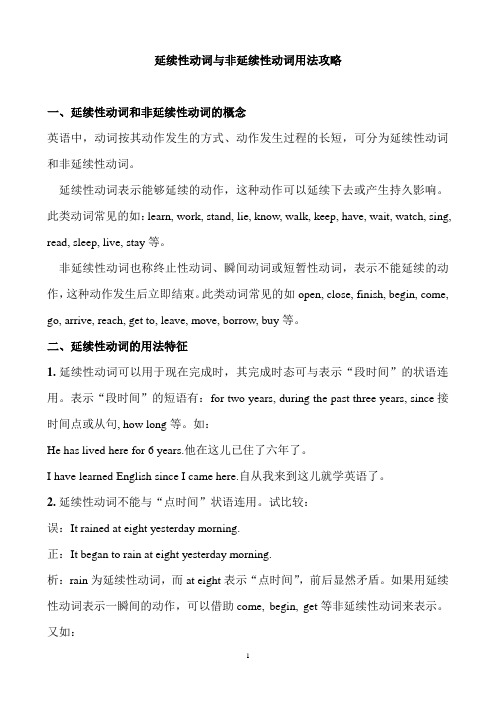
延续性动词与非延续性动词用法攻略一、延续性动词和非延续性动词的概念英语中,动词按其动作发生的方式、动作发生过程的长短,可分为延续性动词和非延续性动词。
延续性动词表示能够延续的动作,这种动作可以延续下去或产生持久影响。
此类动词常见的如:learn, work, stand, lie, know, walk, keep, have, wait, watch, sing, read, sleep, live, stay等。
非延续性动词也称终止性动词、瞬间动词或短暂性动词,表示不能延续的动作,这种动作发生后立即结束。
此类动词常见的如open, close, finish, begin, come, go, arrive, reach, get to, leave, move, borrow, buy等。
二、延续性动词的用法特征1.延续性动词可以用于现在完成时,其完成时态可与表示“段时间”的状语连用。
表示“段时间”的短语有:for two years, during the past three years, since接时间点或从句, how long等。
如:He has lived here for 6 years.他在这儿已住了六年了。
I have learned English since I came here.自从我来到这儿就学英语了。
2.延续性动词不能与“点时间”状语连用。
试比较:误:It rained at eight yesterday morning.正:It began to rain at eight yesterday morning.析:rain为延续性动词,而at eight表示“点时间”,前后显然矛盾。
如果用延续性动词表示一瞬间的动作,可以借助come, begin, get等非延续性动词来表示。
又如:--When did you get to know Jack?你什么时候认识杰克的?--Two years ago.两年前。
延续性动词和短暂性动词的区别
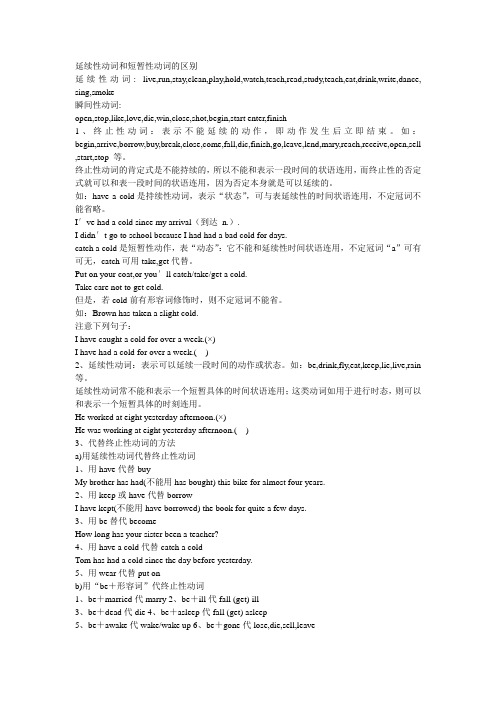
延续性动词和短暂性动词的区别延续性动词: live,run,stay,clean,play,hold,watch,teach,read,study,teach,eat,drink,write,dance, sing,smoke瞬间性动词:open,stop,like,love,die,win,close,shot,begin,start enter,finish1、终止性动词:表示不能延续的动作,即动作发生后立即结束。
如:begin,arrive,borrow,buy,break,close,come,fall,dic,finish,go,leave,lend,mary,reach,receive,open,sell ,start,stop 等。
终止性动词的肯定式是不能持续的,所以不能和表示一段时间的状语连用,而终止性的否定式就可以和表一段时间的状语连用,因为否定本身就是可以延续的。
如:have a cold是持续性动词,表示“状态”,可与表延续性的时间状语连用,不定冠词不能省略。
I′ve had a cold since my arrival(到达n.).I didn′t go to school because I had had a bad cold for days.catch a cold是短暂性动作,表“动态”:它不能和延续性时间状语连用,不定冠词“a”可有可无,catch可用take,get代替。
Put on your coat,or you′ll catch/take/get a cold.Take care not to get cold.但是,若cold前有形容词修饰时,则不定冠词不能省。
如:Brown has taken a slight cold.注意下列句子:I have caught a cold for over a week.(×)I have had a cold for over a week.()2、延续性动词:表示可以延续一段时间的动作或状态。
延续性动词与非延续性动词的区别
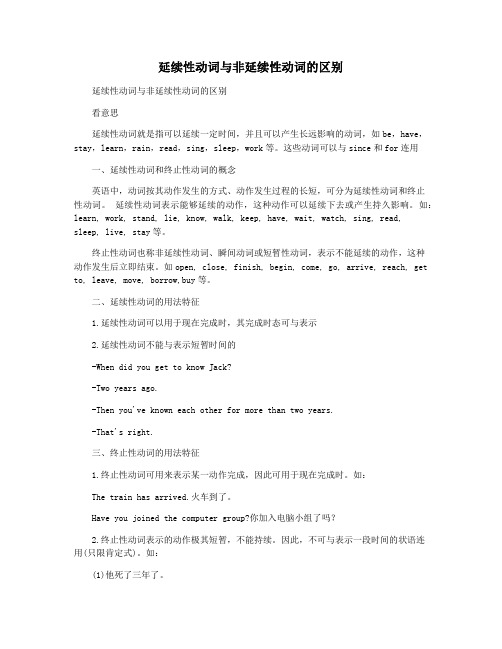
延续性动词与非延续性动词的区别延续性动词与非延续性动词的区别看意思延续性动词就是指可以延续一定时间,并且可以产生长远影响的动词,如be,have,stay,learn,rain,read,sing,sleep,work等。
这些动词可以与since和for连用一、延续性动词和终止性动词的概念英语中,动词按其动作发生的方式、动作发生过程的长短,可分为延续性动词和终止性动词。
延续性动词表示能够延续的动作,这种动作可以延续下去或产生持久影响。
如:learn, work, stand, lie, know, walk, keep, have, wait, watch, sing, read, sleep, live, stay等。
终止性动词也称非延续性动词、瞬间动词或短暂性动词,表示不能延续的动作,这种动作发生后立即结束。
如open, close, finish, begin, come, go, arrive, reach, get to, leave, move, borrow,buy等。
二、延续性动词的用法特征1.延续性动词可以用于现在完成时,其完成时态可与表示2.延续性动词不能与表示短暂时间的-When did you get to know Jack?-Two years ago.-Then you've known each other for more than two years.-That's right.三、终止性动词的用法特征1.终止性动词可用来表示某一动作完成,因此可用于现在完成时。
如:The train has arrived.火车到了。
Have you joined the computer group?你加入电脑小组了吗?2.终止性动词表示的动作极其短暂,不能持续。
因此,不可与表示一段时间的状语连用(只限肯定式)。
如:(1)他死了三年了。
误:He has died for three years.正:He has been dead for three years.正:He died three years ago.正:It is three years since he died.正:Three years has passed since he died.(2)他来这儿五天了。
[宝典]连续性动词与非连续性动词
![[宝典]连续性动词与非连续性动词](https://img.taocdn.com/s3/m/2a9132d15ebfc77da26925c52cc58bd6318693c7.png)
动词按其动作发生的方式、动作发生过程的长短,可分为延续性动词和终止性动词。
一.延续性动词表示能够延续的动作如:learn, work, stand, lie, know, walk, keep, ha ve, wait, watch, sing, read, sleep, live, stay等。
延续性动词可以与表示时间段的状语连用。
表示时间段的短语有:for+一段时间,for 2 years; since从句,since he came here; since+时间点名词,since last year, since 5 days ago; how long; for a long time等。
例:He has lived here for 6 years. You can keep the book for 5 days. I stayed there for 2 weeks last year. How long did you stay there last year?二.非延续性动词也称终止性动词、瞬间动词表示不能延续的动作,这种动作发生后立即结束。
如:open, die, close, begin, finish, come, go, move, borrow, lend, buy等。
非延续性动词在肯定句中与表示时间点的状语连用,如:two years ago; at 5o'clock;例:He died 5 years ago.否定的终止性动词可以与表示时间段的时间状语连用。
例:I haven't left here for 3 years. I haven't heard from him for 3 weeks.三.延续性动词与非延续性动词之间的转换leave --- be away, borrow --- keep, buy --- have, begin/start --- be on, die --- be dead, finish --- be over, join --- be in+组织机构, be a member of+组织机构, open sth --- keep sth open, fall ill --- be ill, get up---be up, catch a cold --- have a cold, come here --- be here, go there --- be there, become --- be, come back --- be back, fall asleep --- be asleep, get to/ arrive/reach --- be (in), leave --- be away from, get to know --- know, go (get) out →be out,put on→ wear;catch a cold →have a cold 等。
初中英语延续性动词与非延续性动词

如何变换:
Come- be here
Go –
be there leave→ be away, borrow→ keep, buy→ have, begin/start → be on, die→ be dead, move to→ live in, finish→ be over, join→ be in/be a member of,
open sth.→ keep sth. open, feel ill→ be ill, get up→ be up,
become --- be,
come back --- be back,
fall asleep --- be asleep, get to/ arrive/reach --- be (in), leave --- be away from, get to know --- know,
16.The bus ______ on the road for 2 hours so far. A. has stopped B. stopped C. has been 17.Are you _____ the jacket these days? A. wearing
go (get) out →be out,
put on→ wear;
初中英语语法 延续性动词与非延续性动词专项训练
1.
√
When he arrived at the bus stop, the bus ________ for 20 minutes. A. has left B. had left C. has been away D. had been away 2. I ______ the League for 5 years so far. A. joined B. have joined C. have been in 3. The factory ________ since the February of 1988. A . has been open B. has opened C. was open D. opened 4. Mary and Rose _______friends since they met in 2000. A. have made B. have been C. made D. have become 5.You mustn't ________ until he comes back. A. be away B. leave C. be left
终止性动词和延续性动词的用法小结
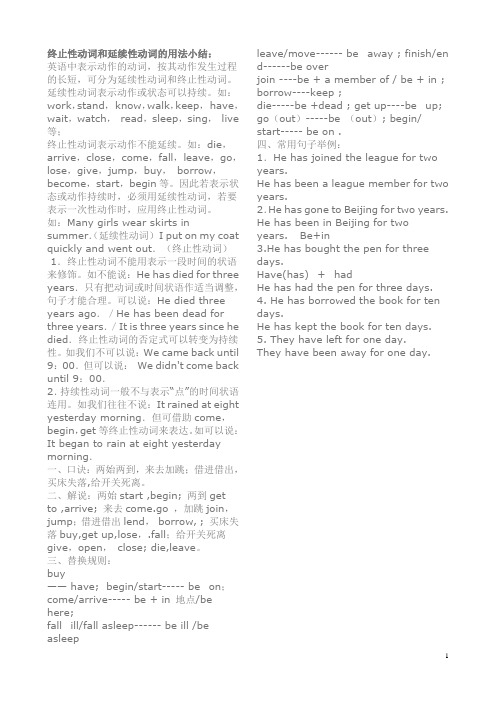
终止性动词和延续性动词的用法小结:英语中表示动作的动词,按其动作发生过程的长短,可分为延续性动词和终止性动词。
延续性动词表示动作或状态可以持续。
如:work,stand,know,walk,keep,have,wait,watch,read,sleep,sing,live 等;终止性动词表示动作不能延续。
如:die,arrive,close,come,fall,leave,go,lose,give,jump,buy,borrow,become,start,begin等。
因此若表示状态或动作持续时,必须用延续性动词,若要表示一次性动作时,应用终止性动词。
如:Many girls wear skirts in summer.(延续性动词)I put on my coat quickly and went out.(终止性动词) 1.终止性动词不能用表示一段时间的状语来修饰。
如不能说:He has died for three years.只有把动词或时间状语作适当调整,句子才能合理。
可以说:He died three years ago./He has been dead for three years./It is three years since he died.终止性动词的否定式可以转变为持续性。
如我们不可以说:We came back until 9:00.但可以说:We didn't come back until 9:00.2.持续性动词一般不与表示“点”的时间状语连用。
如我们往往不说:It rained at eight yesterday morning.但可借助come,begin,get等终止性动词来表达。
如可以说:It began to rain at eight yesterday morning.一、口诀:两始两到,来去加跳;借进借出,买床失落,给开关死离。
二、解说:两始start ,begin; 两到getto ,arrive; 来去come.go ,加跳join,jump;借进借出lend,borrow, ; 买床失落buy,get up,lose,.fall;给开关死离give,open,close; die,leave。
延续性动词和终止性动词的区别及用法

延续性动词和终⽌性动词的区别及⽤法延续性动词和终⽌性动词的区别及⽤法⼀、延续性动词和终⽌性动词的概念英语中,动词按其动作发⽣的⽅式、动作发⽣过程的长短,可分为延续性动词和终⽌性动词。
延续性动词表⽰能够延续的动作,这种动作可以延续下去或产⽣持久影响。
如:learn, work, stand, lie, know, walk, keep, have, wait, watch, sing, read, sleep, live, stay等。
终⽌性动词也称⾮延续性动词、瞬间动词或短暂性动词,表⽰不能延续的动作,这种动作发⽣后⽴即结束。
如open, close, finish, begin, come, go, arrive, reach, get to, l eave, move, borrow,buy等。
⼆、延续性动词的⽤法特征1.延续性动词可以⽤于现在完成时,其完成时态可与表⽰"段时间"的状语连⽤。
表⽰"段时间"的短语有:for two years, during the past three years, since last year, how long等。
如:I have learned English since I came here.⾃从我来到这⼉就学英语了。
2.延续性动词不能与表⽰短暂时间的"点时间"状语连⽤。
如:It raind at eight yesterday morning.(误) rain为延续性动词,⽽at eight表⽰"点时间",前后显然⽭盾。
如果⽤延续性动词表⽰⼀瞬间的动作,可以借助come, begin, get等终⽌性动词来表⽰。
上句可改为:It began to rain at eight yesterday morning.(正)⼜如:-When did you get to know Jack?-Two years ago.-Then you've known each other for more than two years.-That's right.三、终⽌性动词的⽤法特征1.终⽌性动词可⽤来表⽰某⼀动作完成,因此可⽤于现在完成时。
现在完成时之延续性动词与终止性动词延续性动词

现在完成时之延续性动词与终止性动词延续性动词现在完成时之现在完成时之现在完成时之现在完成时之延续性动词与终止性动词延续性动词与终止性动词延续性动词与终止性动词延续性动词与终止性动词动词按其动作发生的方式,动作发生过程的长短,分为延续性动词和终止性动词。
延续性动词表示的动词是一种延续的动作,这种动词可以延续下去或产生持久的影响。
如:learn,work,stand,lie,know,walk,keep, have,wait,watch,sing,read,sleep,live终止性动词也称非延续性动词、瞬间动词,表示的动作不能延续,即动作发生立即结束,产生某种结果。
在有了某种结果之后,就不能再继续下去。
如:leave,start,set out,arrive,reach,get to,begin, stop,shut,turn off,marry,put,put on,get up,wake,fall,join,receive, finish,end,complete,become,come,go,die,close,open,break,give, jump,buy,borrow等。
1.终止性动词的用法1)终止性动词可用来表示某一动作的完成,因此可用于现在完成时。
如: The plane has arrived飞机到了。
I have finished my homework.我已完成了作业。
2)终止性动词表示的动作极其短暂,不能持续,所以其现在完成时(只限于肯定式)不能和表示一段时间的状语连用。
如:①他死了三年了。
误:He has died for three years.②他来这儿三个月了。
误:he has come here for three months.①②两句中的动词die和come都为终止性动词,它们可用于完成时,但不能同表示一段时间的状语for three years /months连用。
延续性动词和终止性动词的区别及用法

延续性动词和终止性动词的区别及用法一、延续性动词和终止性动词的概念英语中,动词按其动作发生的方式、动作发生过程的长短,可分为延续性动词和终止性动词。
延续性动词表示能够延续的动作,这种动作可以延续下去或产生持久影响。
如:learn, work, sta nd, lie, know, walk, keep, have, wait, watch,sing, read, sleep, live, stay等。
终止性动词也称非延续性动词、瞬间动词或短暂性动词,表示不能延续的动作,这种动作发生后立即结束。
如ope n, close, fini sh, beg in, come, go, arrive, reach, get to, leave, move, borrow,buy 等。
二、延续性动词的用法特征1. 延续性动词可以用于现在完成时,其完成时态可与表示"段时间"的状语连用。
表示"段时间"的短语有:for two years, duri ng the past three years, since last year,how long 等。
如:I have learned English since I came here.自从我来到这儿就学英语了。
2. 延续性动词不能与表示短暂时间的"点时间"状语连用。
如:It raind at eight yesterday mornin g.(误)rain 为延续性动词,而at eight表示"点时间",前后显然矛盾。
如果用延续性动词表示一瞬间的动作,可以借助come, begin, get等终止性动词来表示。
上句可改为:It began to rain at eight yesterday morning.(正)又如:-When did you get to know Jack-Two years ago.-Then you've known each other for more than two years.-That's right.三、终止性动词的用法特征1. 终止性动词可用来表示某一动作完成,因此可用于现在完成时。
延续性动词和非延续性动词以及when_while的用法和区别

when和while引导的时间状语从句(一) ....................... 、when, while都有"当时候”的意思。
when既可表示某一点时间,............... 也可以表示某一段时间。
在when引导的时间状语从句中,其谓语动词可以是延续性的,也可以是非延续性的,可与主句中的谓语动词同时发生,也可在其后发生。
例如:1、I was just reading a book when she came into my room. 她走进我房间时,我正在看书。
2、Were you writi ng whe n the teacher came in 老师进来的时候,你在写信吗3、When he was a child he was always trying out new ideas. 他小时候就常常试验一些新的设想。
(二)、while只能表示某一段时间,不能表示某一点时间。
在while引导的时间状语从句中,其谓语动词只能是延续性的,而且也只能与主句中的谓语动词同时发生或存在。
例如:1、While Jim was men di ng his bike, Lin Tao came to see him. 正当吉姆修自行车时,林涛来看他。
2、You can' t do your homework while you ' re watching TV. 你不能一边看电视一边做家庭作业。
(三八另外,when和while的区别还在于:while引导的时间状语从句多用进行时态,而when引导的时间状语从句多用一般时态。
例如:1、While they were talking, the bell rang. 正在他们谈话的时候,上课铃响了。
2、I was doing my homework when my mother came back home yesterday evening.昨天晚上妈妈回家的时候一、延续性动词和终止性动词的概念英语中,动词按其动作发生的方式、动作发生过程的长短,可分为延续性动词和终止性动词。
浅谈终止性动词和延续性动词

浅谈终止性动词和延续性动词延续性动词: live,run,stay,clean,play,hold,watch,teach,read,study,teach,eat,drink,write,dance, sing,smoke瞬间性动词:open,stop,like,love,die,win,close,shot,begin,start enter,finish1、终止性动词:表示不能延续的动作,即动作发生后立即结束。
如:begin,arrive,borrow,buy,break,close,come,fall,dic,finish,go,leave,lend,mary,reach,receive,open,sell ,start,stop等。
终止性动词的肯定式是不能持续的,所以不能和表示一段时间的状语连用,而终止性的否定式就可以和表一段时间的状语连用,因为否定本身就是可以延续的。
如:have a cold是持续性动词,表示“状态”,可与表延续性的时间状语连用,不定冠词不能省略。
I′ve had a cold since my arrival(到达n.).I didn′t go to school because I had had a bad cold for days.catch a cold是短暂性动作,表“动态”:它不能和延续性时间状语连用,不定冠词“a”可有可无,catch可用take,get代替。
Put on your coat,or you′ll catch/take/get a cold.Take care not to get cold.但是,若cold前有形容词修饰时,则不定冠词不能省。
如:Brown has taken a slight cold.注意下列句子:I have caught a cold for over a week.(×)I have had a cold for over a week.( )2、延续性动词:表示可以延续一段时间的动作或状态。
- 1、下载文档前请自行甄别文档内容的完整性,平台不提供额外的编辑、内容补充、找答案等附加服务。
- 2、"仅部分预览"的文档,不可在线预览部分如存在完整性等问题,可反馈申请退款(可完整预览的文档不适用该条件!)。
- 3、如文档侵犯您的权益,请联系客服反馈,我们会尽快为您处理(人工客服工作时间:9:00-18:30)。
延续性动词和终止性动词的区别及用法一、延续性动词和终止性动词的概念英语中,动词按其动作发生的方式、动作发生过程的长短,可分为延续性动词和终止性动词。
延续性动词表示能够延续的动作,这种动作可以延续下去或产生持久影响。
如:learn, work, stand, lie, know, walk, keep, have, wait, watch, sing, read, sl eep, live, stay等。
终止性动词也称非延续性动词、瞬间动词或短暂性动词,表示不能延续的动作,这种动作发生后立即结束。
如open, close, finish, begin, come, go, arrive, reach, get to, leave, move, borr ow,buy等。
二、延续性动词的用法特征1.延续性动词可以用于现在完成时,其完成时态可与表示"段时间"的状语连用。
表示"段时间"的短语有:for two years, during the past three years, since last year, how long等。
如:I have learned English since I came here.自从我来到这儿就学英语了。
2.延续性动词不能与表示短暂时间的"点时间"状语连用。
如:It raind at eight yesterday morning.(误) rain为延续性动词,而at eight表示"点时间",前后显然矛盾。
如果用延续性动词表示一瞬间的动作,可以借助come, begin, get等终止性动词来表示。
上句可改为:It began to rain at eight yesterday morning.(正)又如:-When did you get to know Jack?-Two years ago.-Then you've known each other for more than two years.-That's right.三、终止性动词的用法特征1.终止性动词可用来表示某一动作完成,因此可用于现在完成时。
如:The train has arrived.火车到了。
Have you joined the computer group?你加入电脑小组了吗?2.终止性动词表示的动作极其短暂,不能持续。
因此,不可与表示一段时间的状语连用(只限肯定式)。
如:(1)他死了三年了。
误:He has died for three years.正:He has been dead for three years.正:He died three years ago.正:It is three years since he died.正:Three years has passed since he died.(2)他来这儿五天了。
误:He has come here for five days.正:He has been here for five days.正:He came here five days ago.正:It is five days since he came here.正:Five days has passed since he came here.(1)、(2)句中的die、come为终止性动词,不能与表示"段时间"的状语连用。
那么,应如何正确表达呢?可以采用下面的四种方法:(1)将句中终止性动词转换为相应的延续性动词,如上面两例中的第一种正确表达方式。
下面列举几例:leave→be away, borrow→keep, buy→have, begin/start →be on, die→be dead, move to→live in, finish→be over, join→be in/be a member of, open sth.→keep sth. open, fall ill→be ill, get up→be up, catch a cold→have a cold。
(2)将句中表示"段时间"的状语改为表示过去确定时间的状语,如下面两例中的第二种正确表达方式。
(3)用句型"It is+段时间+since..."表达原意,如上面两例中的第三种正确表达方式。
(4)用句型"时间+has passed+since..."表达原意,如上面两例中的第四种正确表达方式。
3.终止性动词可用于现在完成时否定式中,成为可以延续的状态,因而可与表示一段时间的状语连用。
如:He hasn't left here since 1986.I haven't heard from my father for two weeks.4.终止性动词的否定式与until/till连用,构成"not+终止性动词+until/till ..."的句型,意为"直到……才……"。
如:You can't leave here until I arrive.直到我到了,你才能离开这里。
I will not go to bed until I finish drawing the picture tonight.今天晚上直到我画完画,我才上床睡觉。
5.终止性动词可以用于when引导的时间状语从句中,但不可以用于while引导的时间状语从句中。
when表示的时间是"点时间"(从句谓语动词用终止性动词),也可以是"段时间"(从句谓语动词用延续性动词)。
而while表示的是一个较长的时间或过程,从句谓语动词用延续性动词。
如:When we reached London, it was twelve o'clock. (reach为终止性动词) Please look after my daughter while/when we are away. (be away为延续性动词短语)6.终止性动词完成时不可与how long连用(只限于肯定式)。
如:误:How long have you come here?正:How long have you been here?正:When did you come here?延续性动词与非延续性动词及其转换动词按其动作发生的方式、发生过程的长短可分为延续性动词与非延续性动词。
一.延续性动词表示能够延续的动作,如:learn, work, stand, lie, know, walk, keep, have, wait, watch, sing, read, sleep, live, stay等。
延续性动词可以与表示时间段的状语连用。
表示时间段的短语有:for+一段时间,for 2 years; since从句,since he came here; since+时间点名词,since last year, since 5 days ago; how long; for a long time等。
例:He has lived here for 6 years. You can keep the book for 5 days. I stayed there for 2 weeks last year. How long did you stay there last year?二.非延续性动词也称终止性动词,表示不能延续的动作,这种动作发生后立即结束。
如:open, die, close, begin, finish, come, go, move, borrow, lend, buy等。
非延续性动词在肯定句中与表示时间点的状语连用,如:two years ago; at 5 o'clock;例:He died 5 years ago.否定的终止性动词可以与表示时间段的时间状语连用。
例:I haven't left here for 3 years. I haven't heard from him for 3 weeks.三.延续性动词与非延续性动词之间的转换:leave --- be away, borrow --- keep, buy --- have, begin/start --- be on, die --- be dead, finish --- be over, join --- be in+组织机构, be a member of+组织机构, open sth --- keep sth open, fall ill --- be ill, get up---be up, catch a cold --- have a cold, come here --- be here, go there --- be there, become --- be, come back --- be back, fall asleep --- be asleep, get to/ arrive/reach --- be (in), leave --- be away from, get to know --- know, go (get) out →be out,put on→ wear;catch a cold →have a cold等。
例:The old man died 4 years ago. ----The old man has been dead for 4 years. ---- It is 4 years since the old man died. ----Four years has passed since the old man died. He joined the Party 2 years ago. -----He has been in the Party for 2 years. I bought the book 5 days ago. ---- I have had the book for 5 days.补充练习:1. When he arrived at the bus stop, the bus ________ for 20 minutes.A. has leftB. had leftC. has been awayD. had been away2. I ______ the League for 5 years so far.A. joinedB. have joinedC. have been in3. The factory ________ since the February of 1988.A . has been open B. has opened C. was open D. opened4. Mary and Rose _______friends since they met in 2000.A. have madeB. have beenC. madeD. have become5.You mustn't ________ until he comes back.A. be awayB. leaveC. be left6.The meeting _______ for a week now.A. has finishedB. has endedC. has been over7.Miss Gao ______ this school for nearly 5 years.A. has been inB. has come toC. has taught8.Ben ______ a teacher for 4 years .A. has beenB. has becomeC. wasD. became9. I ______ home for a week.A. have returnedB. have been backC. returned10. How long _______ he ________ ?A. diedB. has, diedC. has, been dead11. He ______ at eight yesterday afternoon.A. sleptB. was sleepingC. has sleepD. had slept12.He ________ the car for a week.A. boughtB. has boughtC. has had13.-----How long _____ you _____ ill ? -----Two weeks.A. did fallB. have, fellC. have, been14.Since 2000, he _____ his hometown.A. has leftB. has moved awayC. has been away from15.I'll lend you the book , but you can only _____ it for 2 days.A. borrowB. keepC. take16.The bus ______ on the road for 2 hours so far.A. has stoppedB. stoppedC. has been17.Are you _____ the jacket these days?A. wearingB. putting onC. dressingD. on18.He ________ foe 2 hours.A. got upB. has got upC. has been up19. Tom is ill in hospital. He _______ a cold for several days.A. isB. catchesC. has caughtD. has had20.----- How long can I ______ the book? ------ Two weeks.A. borrowB. lendC. getD. keepKey:1---5 D C A B B; 6---10 C A A B C; 11---15 B C C C B; 16---20 C A C D D初中英语中短暂性动词与延续性动词的用法英语中,按动词延续的时间长短,可将动词分为延续性动词和短暂性动词。
